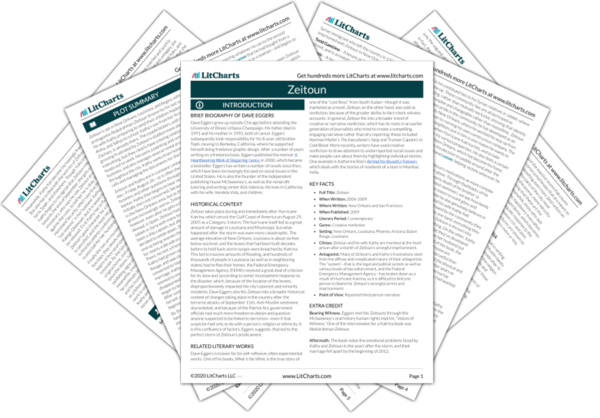Summary
Analysis
Today, Zeitoun and the others are told that they’ll be moving out of what they’ve called “Camp Greyhound.” Zeitoun is handcuffed to another prisoner and told to board a simple old school bus. No one is told where they’re going, and Jerry is gone.
“Camp Greyhound,” which sounds benign enough, is an ironic name for a place that has become so grim. Even leaving it is the occasion for more confusion rather than resolution.
Themes
They drive north out of the city and Zeitoun sees a mass of dry land for the first time since the storm. Forty miles on, Zeitoun sees a sign for St. Gabriel. For Zeitoun this is a good sign: in Islam, Gabriel is the archangel who revealed the Qur’an to the Prophet Muhammad—the same angel who spoke to the Virgin Mary in the Bible and foretold the birth of Jesus.
St. Gabriel is the name of a small town outside Baton Rouge, Louisiana—but for Zeitoun, who is always willing to see God’s work in everything, it is a small comfort. This is yet another reminder of the similarities between Islam and other religions.
Themes
The bus slows and Zeitoun sees a sign: the “Elayn Hunt Correctional Center,” a maximum-security prison. Most of the men on the bus don’t seem surprised. All the one-story red brick buildings are laid out in orderly grids, surrounded by barbed wire-topped fences.
The memory of the religious Saint Gabriel consoles Zeitoun briefly, but he is soon forced to face his new reality: no longer a makeshift prison but a full, permanent establishment.
Themes
Upon entering, Zeitoun is greeted by two polite women who ask him about his health, medications, and food restrictions. They seem professional and respectful, and Zeitoun hopes this means that he’ll finally get his phone call. He removes his clothing in another room with a dozen other prisoners and is given an orange jumpsuit. They drive through the complex to the last block, a high-security section.
Zeitoun’s experience with the authorities thus far has been one of indifference or outright hostility, and even a casual example of kindness feels far more positive. But it seems that Zeitoun’s optimistic outlook is not to result in better treatment or any real change in his circumstances.
Themes
Get the entire Zeitoun LitChart as a printable PDF.

Zeitoun is placed in a cement block, six by eight feet, with Nasser. The two barely speak, realizing that their trouble has grown far more serious, especially now that the two Syrian Americans have been isolated. Zeitoun is convinced that his one phone call will free him: people all over New Orleans know him, as he’s successful there. But the guards keep finding new ways to deny him, saying the phone’s broken, maybe tomorrow, or that he’s not “their” prisoner. He hasn’t been processed traditionally and isn’t assigned to Hunt long-term, so he’s not bound by standard operating procedure—instead, as he’s told, he’s “FEMA’s problem,” since the organization is simply renting space to hold these men.
Once again, Zeitoun finds himself imprisoned without knowing if he’ll be given a chance to defend himself or even to contact the outside world. The basic legal right of a phone call is again denied to him. It appears at this point that Zeitoun and Nasser are in legal limbo—they’re housed in a prison complex belonging to one system but as the responsibility of another system, and with these two systems seemingly unable to communicate, two innocent men are caught between them.
Themes
The pain in Zeitoun’s side is worse, becoming a throbbing ache, but he continues to think mainly of Kathy, and by how much she must be suffering. In the middle of the night, he remembers the Qur’an passage called al-Takwir or “The Darkening,” which speaks of the importance of trusting in God at the darkest moments on earth.
In his darkest moments, Zeitoun’s thoughts turn to Kathy, as he recognizes how much she must be suffering in his absence. Like her, he doesn’t know what will happen to him, and instead chooses to put his faith in God.
Themes












